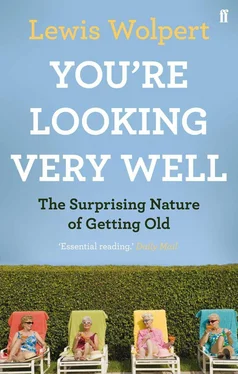As we age, our cells become less efficient and our bodies become less able to carry out their normal functions. Muscles lose strength, hearing and vision become less acute, reflex times slow down, lung capacity decreases, and the heart’s ability to pump blood may be affected. In addition, the immune system weakens, making it less able to fight infection and disease. Heart pumping giving maximum oxygen consumption declines about 10 per cent every ten years in men, and in females a bit less; maximum breathing capacity declines about 40 per cent between ages 20 and 70; the brain shrinks and loses some cells; kidneys become less efficient and the bladder gets smaller; muscle mass decreases by about 20 per cent between 30 and 70 years, though exercise reduces this; and bone mineral is lost from age 35; sight may decline from 40 and hearing declines when older. These changes in our bodies with age are not due to ill health but are, alas, normal, and they can cause health problems.
Once adults reach 40, they start to lose just over 1 per cent of their muscle each year. This could be due to the body’s failure to deliver nutrients and hormones to muscle because of poorer blood supply. Tendons, which connect muscles to bone, and ligaments, which hold joints together, become less elastic and are easier to tear. We also get slower in physical activities, as I know all too well. The good news is that one in five people aged between 65 and 74 are doing recommended levels of exercise. But physical labour can also have negative effects—lawyers and priests over 55 die at lower rates than blacksmiths and ironworkers, and at even lower rates when over 75. Mammalian muscles can regenerate, but in mice the old muscle regenerates poorly. Joining the muscles of old and young mice together resulted in the old muscle regenerating better, and the young a bit worse.
Men and women between 60 and 96 years of age who suffered from loss of body mass and strength, and who did a moderate amount of strength training twice a week, had a significant increase in muscle after eight to twelve weeks. Long-term physical activity postpones disability and sustains independence, even for the chronically ill. Regular physical activity can also help to prevent some important conditions in the elderly that may lead to disability including osteoporosis, type 2 diabetes, cardiovascular disease, anxiety and depression. It can also reduce the risk of falls and therefore subsequent fractures. A goal to work towards is 30 minutes of at least moderately intense physical activity on at least five days of the week. Joan Bakewell, 77, of whom more later, told me, ‘I am not as able as I was and do have some aches and pains, but I have a fetish for staying fit and have done pilates exercises twice a week for fifteen years. I did not want my posture to go, as I noticed I was beginning to stoop.’
* * *
Most human deaths are attributable to an age-related disease and so, not surprisingly, becoming a centenarian is associated with having avoided common diseases until advanced in age. A period of not having good health for the elderly will usually involve some seven years for men, and ten for women. Coronary heart disease, stroke, cancer, osteoporosis, diabetes and dementia are just some of the conditions that more and more people will be battling with in later years. The figures will continue to go up as people live longer than ever before. Obesity increases the likelihood of death from all causes, particularly coronary artery disease and stroke. In addition to these diseases, obese patients suffer an increased incidence of arthritis. The conditions associated with obesity are also associated with ageing. The proportion of intra-abdominal fat, which is related to increased morbidity and mortality, progressively increases with age. Targeting weight loss in the elderly can therefore reduce morbidity from cardiovascular risk factors, and also arthritis.
The leading causes of death in the United States have changed dramatically. In 1900 the top three causes of death were all related to infectious diseases, but by 2009 the leading causes of death for all ages were diseases of the heart and cancer, which together account for 50 per cent. The top four causes of death for persons aged 65 and older—diseases of the heart, cancer, brain dysfunctions related to disease of the blood vessels supplying the brain, and respiratory diseases—were the same as for all ages. In the UK the main causes of death are heart disease and stroke. There is an elusive distinction between the effects of ageing, and having a disease when old, but it is generally accepted that fundamental to ageing is an increasing vulnerability to diseases such as heart disease.
Coronary heart disease is the leading killer of older people and half of all heart attack victims are over 65. Participating in light to moderate physical activities significantly decreases mortality rates in elderly patients. Heart disease is the result of the heart’s blood supply being blocked or interrupted by a build-up of fatty substances in the coronary arteries. Over time, the walls of arteries can become furred up with fatty deposits, a process known as atherosclerosis. When the coronary arteries become narrow due to a build-up of these fatty deposits, the blood supply to the heart will be restricted. A heart attack occurs when blood flow to an area of heart muscle is completely blocked. This prevents oxygen-rich blood from reaching heart muscle and so causes it to die, and then circulation of the blood fails. Without quick treatment, a heart attack leads to serious problems and often death. While men have markedly higher rates of coronary heart disease in middle age than do women, women’s rates of coronary disease begin to rise sharply after menopause.
Failure of the blood supply can also cause strokes. A stroke occurs when the blood supply to the brain is disrupted in some way and the brain cells are deprived of oxygen and other nutrients, causing some cells to become damaged and others to die. The effects of a stroke depend on where the brain was injured, as well as how much damage occurred. The after-effects of stroke are very varied and depend on how and where nerve cells die. Most of the damage caused to the brain is the result of dying nerve cells releasing toxins that damage even more of the brain. A stroke can impact on any number of areas including the ability to move, see, remember, speak, reason, and read and write. Every year about 150,000 people in the UK have a stroke—that’s one person every three and half minutes, every day. A study of elderly stroke victims in a working-class region of London found that many regarded it as a normal crisis in their lives. Although strokes can happen at any age, the vast majority occur in people over 65 years old. However, a new study shows more and more Americans suffering from stroke earlier in life than ever before, indicating that stroke is no longer just an affliction of old age.
Cancer is fundamentally a disease of the elderly, the incidence of cancer in those over 65 being ten times greater than in those younger. Nearly three quarters of cases are diagnosed in people aged 60 and over, and more than a third of cases in people aged 75 and over. More than three quarters of cancer deaths occur in people aged 65 years and over. Although there is a higher number of cancer deaths in the over 65s, cancer causes a greater proportion of deaths in younger people. Among elderly men, cancers of the prostrate and colon are the most common, while for women it is breast cancer. About 80 per cent of all breast cancers occur in women aged over 50.
The relationship between cancer and ageing is quite complex. Genomic instability, DNA damage, is a hallmark of most cancers, and is also a hallmark of ageing, as we will see. There have to be a number of changes to the genes within a cell before it turns into a cancer cell. It then takes time for further changes to occur for the cells to become malignant. The relationship to ageing is probably related to the increased time cells have to develop abnormalities that increase the risk of cancer, and also the increase in time that they are exposed to a cancer-inducing environment. A surprising statistic is that the potential gain in life expectancy which could result from the complete elimination of mortality from cancer in the US would not exceed three years if one were to consider cancer independently of other causes of death.
Читать дальше












